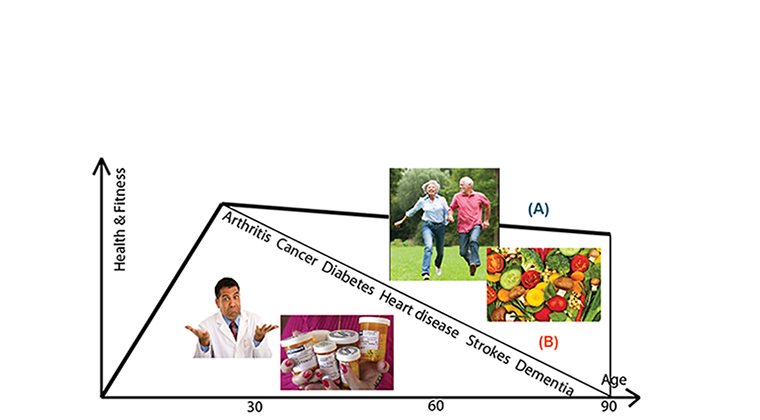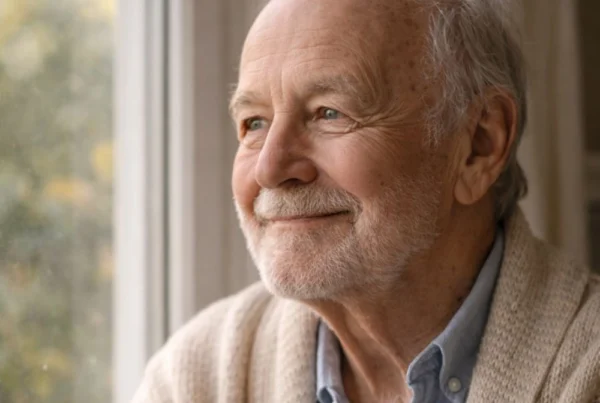Health without medicine – the high road or low road of living
Might it be possible to live a healthy active life to ninety without medical support? Why have we all become used to the idea that our health is dependent on medicine or surgical intervention? Is it really possible to go through our lives without the need for modern medical interventions, barring injuries from falls or accidents? Is this suggestion such a wild idea as to be dismissed out of hand as totally unrealistic?
Well, the truth is that many individuals and whole societies have done just that! Wouldn’t it be interesting and valuable to discover how these individuals have managed without modern medicine? The research leads us to look for common factors in their lifestyles and environments. There are only a few factors that seem to be common to all these people throughout the world and they include their diets, their physical activity, their physical environments, their families and communities, their water supply and air condition, their contentedness and calmness. That’s on the positive health promoting side but on the negative side they are usually not city dwellers, they usually don’t have stressful jobs, they are not suffering political or religious persecution, they are not in war zones, their agriculture has not been industrialised, they are not driven by consumerism or wealth creation beyond what they need to live on, and they have minimal contact with modern technology.
On the basis of the lists above it would appear that most of us in the developed West don’t stand a chance of meeting most of those criteria, so are we doomed to be passive recipients of what the pharmaceutical industry and medical establishment can offer us or can we make progressive shifts towards some of those goals for health?
I believe we can make enormous shifts to improve our chances of good health and a long active life with a little effort and a lot of determination to break old strong established lifestyle habits. The choice really is ours to make; the diagram above depicts two extreme routes our lives from birth to death can follow. The route (B) is what is in store for the majority of us in the West if we carry on doing what we are doing but the route (A) is the alternative option if we start to make the necessary changes in what we are doing.
On the basis of studying many research papers over many years here are some of the lifestyle changes you could begin to implement over the coming months or years that will raise your chances of a long active healthy life and reduce the chances of a slow progressive degeneration requiring more and more medical intervention and medication.
The Body Connection: our bodies are without a doubt the most mysteriously wonderful living beings in the universe, despite all our study and research we still have little understanding of this infinitely complex and beautiful inheritance everyone of us has, even the ‘broken or damaged’ body possesses a remarkable capacity to function well and improve with time. However this does not mean we can abuse and mistreat our body with impunity but that we should do whatever we can to give it at least as much care and attention we give to our houses or our cars! This may mean trying to maintain a good posture, not lifting heavy loads badly, getting enough daily gentle exercise, not disregarding aches and pains but seeking their cause and trying to deal with that. Once the body has suffered a mechanical, structural disturbance from a fall, over straining, repeated postural stresses or even emotional stresses it may need some outside help to realign and rebalance it. Remember any disturbance that causes aches and pains in your back will certainly be causing some disturbance of the nerve supply and functioning of internal organs. Correction to these structural problems may be achieved in many ways using physical therapies or guided exercises.
The Food Connection: there can be no truer saying than “We are what we eat”, how can it be otherwise? Every cell in our body is built and nourished by the food we put in our mouths and the fluids we drink. No sane car owner would try to run a car on waste cooking oil and expect it to work well. Neither would they risk using high-octane aviation fuel if it was designed to run on diesel. So, why do we not care too much about the food we eat? Because our food is not just fuel to power us, but is all the body has, to build new tissue, repair injuries, form the immune system, create the many hormones and complex organic substances needed for the smooth operation of this infinitely complex biological system. It makes sense therefore that our diet must be able to provide a wide variety of nutrients with out any overload of harmful contents of our food. Based on over fifty years of research and the study of millions of people worldwide there is growing evidence that an ideal diet is whole plant based. This is indeed usually the main source of nutrition of those individuals and societies that enjoy long active healthy lives, with small occasional amounts of animal flesh for special occasions.
The Breath Connection: breathing is the most connecting function of man. We each of us breathe in the exhaled air of everyone else throughout the world as well as the exhaled air of every other living creature and the exhaled oxygen from the plants throughout the world. If, as many suggest, health is associated with becoming more whole and having close links to others and our environment, surely breathing is an important factor. However, modern man in the West has over the past few decades developed a widespread unhealthy condition that is over-breathing or chronic hidden hyperventilation. Between seventy-five and ninety percent of people now breathe over double the amount of air they should for good body oxygenation. Why this is so is open to debate – there are two key possible reasons; the first is repeated stresses trigger the primitive fight or flight response that in turn causes increases in breathing rate, and secondly, our modern lifestyle of an over affluent diet with less and less physical exercise has a similar effect on our breathing. Most people can retrain their breathing back to normal in just a few weeks with the right instruction and perseverance. The remarkable effect this has on the individual is to teach them to be more relaxed and not so reactive to everyday stresses, a reduction in the unhealthy effects of stress is a great aid to good health.
The Mind Connection: it is increasingly recognised that there is a powerful connection between mind and body, in fact the latest research indicates our mental activity, our thoughts and attitudes not only affect our physical bodies, the psycho-somatic effect, but also reshape our brains. That our brains are not the fixed, unchanging structure we have been led to believe but are quite plastic and are continually changing depending upon our activities and thoughts every day. One of the common elements amongst primitive people who live healthy long active lives is invariably a calm and contented mind. It is no accident that there is currently much interest in teaching this to everyone in stressful work or suffering anxiety, and mindfulness is one approach that helps teach individuals to shift their attention from the stressful things in their lives to greater awareness of their surroundings and the comfort of their body through relaxation. Breath training is a vital element in this training for the reasons given above. Often unconscious thought patterns can lead to ill health either because of stress from anxiety or behavioural problems. Here there are ways of helping lift these unconscious traits into the conscious and then positively change them – remember our minds are plastic and can change!
More comprehensive information on all these factors underpinning health can be found at TotalHealthMatters
Michael Lingard BSc. DO BBEC







